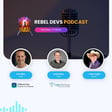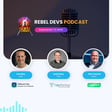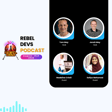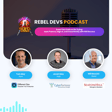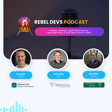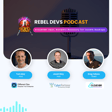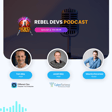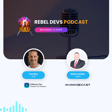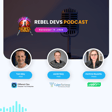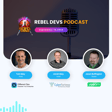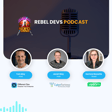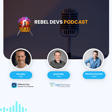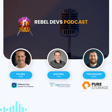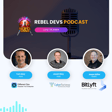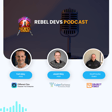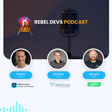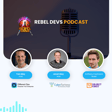Become a Creator today!Start creating today - Share your story with the world!
Start for free
00:00:00
00:00:01

2025 Veeam Hackathon
Description:
In this episode of The Rebel Devs Podcast, hosts Tom May and Jonah May are joined by Maurice Kevenaar to talk all things Veeam Community Hackathon 2025 — how it’s evolved, what’s new this year, and why it’s more than just coding. The trio dives into the creative chaos of global collaboration, the power of community-driven innovation, and even the quirks of modern AI tools like ChatGPT and Copilot. From hackathon tips to philosophical takes on artificial intelligence (and a few off-the-rails tangents about vinegar driveways and pet fish), this episode blends tech, humor, and real talk in true Rebel Devs style.
👉 Sign up for the Veeam Community Hackathon: VeeamHackathon.com
Links & Resources
- Past Projects: veeamhackathon.com/previous-years
- Sponsor Company: differentdev.com
- Sponsor Company: cyberfortress.com
Transcript
00:00:17
Speaker
Rebel Devs podcast, a show that challenges conventional thinking in the tech industry. Each episode features conversations with solutionists who have taken unconventional approaches to problem solving, pushing the boundaries of what's possible in their respective fields.
00:00:38
Speaker
Join the devolution. Good day, everyone, and welcome to another episode of the RebelDevs podcast. I'm your host, Jonah May. I've got Tom here with me. Tom, how's it going?
00:00:50
Speaker
Oh, it's going great. I'm excited to talk about today's topic. It's been a while. think it's been a year, but I'm excited. Yeah, and on that note, we've also got Maurice with us again, so we can talk any and all things hackathon again and whatever other tech we decide to get into because we're all ADD sometimes and tend to go off on tangents.
00:01:12
Speaker
Hello. How are you guys doing? Yeah, I'm doing pretty well myself. Yeah, so am I. Well, let's roll up our sleeves and get in here before I get distracted by all the cool stuff in Jonah's background.
00:01:24
Speaker
Yeah, cool stuff in my background. More like organized chaos in my background as we still finish getting my girlfriend unpacked after she moved in. All right. Well, we're here for the hackathon, so let's go ahead and and dive in.
00:01:37
Speaker
This is correct me if I'm wrong, is this number three now that we're in? Yeah, this is the third year that we are running the Veeam Community Hackathon. um And this year it's longer than ever.
00:01:48
Speaker
um We are doing it for a whole five days this time. um That means that people have ah basically a whole work week to do their hacking all together.
00:02:00
Speaker
Plus, I think almost a whole work week of coding, of not coding, brainstorming as well, right? Yes, correct. Wow, that's quite a big bump up from past years. I think the first year was what, maybe be a day. Last year was a little longer. Three days.
00:02:16
Speaker
but What's the reason for the change? Well, the the thing is when you're trying to create a product, and one day or three days is a really short period of time.
00:02:29
Speaker
Also, that really gives you a a short time to work. in between of your normal work schedule. So with this, we hope people have a bit more time to work on their projects aside from their day to day jobs, if they wish to collaborate with their team aside from their work.
00:02:53
Speaker
So they have a bit more time to to to get it from off the ground. you And everyone kept asking for it. Hey, we wish it was longer. Hey, we wanted to do more.
00:03:04
Speaker
hey, we would have helped, but our schedule didn't align during that time period. Well, I guess we should let the listeners know. Tell us the dates and the key milestones. Well, this year we start at December 8 at 9 a.m. m Eastern time or 1500 Central European saving times.
00:03:24
Speaker
And it runs until December 13, the same times. And then we have some signups going out, I'm sure. So when can we start signing up for this? Now you can still sign up until November 17.
00:03:37
Speaker
um Go to vmhackathon.com slash sign dash up and you will find the sign up link. What's a sign up sheet? Perfect. And we'll put that in the show notes, too, for those that are listening. You can go ahead and look in there um from home.
00:03:50
Speaker
Maybe rewind. You'll catch that link again. But all right, guys, we've had a great progression. So really what I want to do is go from little history lesson, guys. We started out with a hackathon that kicked off and then We had some experiences. We had some winners. Then we came back and we revamped a little bit. And I think there were some exciting projects and whatnot.
00:04:13
Speaker
So um if you will, go ahead and tell us a little bit more about that background. My background. Well, there's a lot more books. ah Very good.
00:04:26
Speaker
Yeah. I know. I know. and know Oh, if somebody's listening early, it's going to be so, so early. So, okay. Well, let's go with the background of the hackathon because I know we started out, we didn't know what it would look like and it really is taking some good form.
00:04:46
Speaker
Yeah, it does. um Well, it all started with me having an idea to create a hackathon. And I reached out to Jonah, I think in February 2023 or so, with this idea.
00:05:03
Speaker
And we wanted to do something for the community that is a bigger event that runs for a couple of days and brings the world together.
00:05:15
Speaker
um And yeah, give people a bit of a taste of what it is to be a Vanguard and or a legend to have direct communication with all the great people that we have over at Veeam that are really high in product management and product strategy and whatnot and are basically less accessible for people in the community.
00:05:38
Speaker
um So with that hackathon, we try to give them a a touch or feeling or what it is to communicate with product management and product strategy and and and and build something out of it.
00:05:58
Speaker
So in the first year, yeah tell me a little bit about the winners and there are the cool projects in there. So what did that look like? joah um do you want to take one?
00:06:09
Speaker
Yep. um checking double checking my reference sheet here because I know I can talk about some of the cool projects but I always have to well that's the winners work because there were so many cool projects well go with cool projects from year one year two I'm just curious to see the progression there ah Well, year one, there was a team that did a couple of different projects with Castin.
00:06:30
Speaker
And amongst that was, i if I remember right, some visualizers in order to help find container templates, as well as my personal favorite, I think, which was a Veeam backup for Microsoft 365 best practices checker.
00:06:45
Speaker
which I know later Jonathan, who maintains a lot of the as built reports, ended up using some of the logic as kind of like a bouncing point for him to build an as built report, which I've always found useful.
00:06:57
Speaker
And then, of course, there was your team, Tom, who did some projects around the one visualization and a team that did Beam backup and replication where they tried to make some REST API and PowerShell helpers, which is interesting because everyone kind of went off in different directions, right? No team did the same thing.
00:07:19
Speaker
But then the following year, last year, we had two smaller but larger teams hoping to, you know, enhance collaboration a little bit and They both kind of did the same thing, but they took different approaches, which was interesting to see.
00:07:35
Speaker
They wanted to make it so that you could more easily visualize your data. And I think one group used Veeam Service Provider Console while the other went with Veeam 1 for how they got that data. Yeah, that looked amazing.
00:07:48
Speaker
um I was so proud of both themes after the second year, what they achieved in in those three days. It was just awesome to look at. Yeah, agreed.
00:08:00
Speaker
It was really impressive to see. Wow, it sounds so impressive. You're like reading your screen. You sound like a robot to us all. So, um all right. Well, that I... i I want to touch upon something that you said, Maurice, about getting access to product management.
00:08:18
Speaker
And I was talking of a mutual friend of ours, Jason Buffington, who ah has gone into his own little gig away from Veeam Data Protection Matters. And if you haven't seen him, check him out. He's online and does a lot of analyst work. But...
00:08:32
Speaker
He and I were having a conversation and and Jason's background, he was telling me about how he was a Microsoft MVP first and he had such great access into the Microsoft leadership teams that when he became an internal employee, he actually had less access to those teams.
00:08:47
Speaker
And he made it akin to our Veeam community as well. When you're in the Veeam community, you have a lot of touch points, like you were saying, Maurice, with people that you wouldn't normally come across.
00:08:58
Speaker
and The hackathon is a great interface into that because myself on my team, I worked with Jorge de la Cruz and this was before he was the go-to guy for Veeam One.
00:09:09
Speaker
I think when we started working on that hackathon, he was just a systems engineer, I believe, who was really good with Grafana and Veeam One. And he helped our team quite a bit using the lab and stuff. And now if you look at him, I think he's ah ah something to do with like director of technology.
00:09:29
Speaker
reporting or something on low. So he has Veeam one under the hood and he's just migrated into this. And now meeting with this person myself, hey, it was nice when I need some Veeam one APIs, I was able to say, ho hey, have you ever thought about this? Whereas even if I think I was an internal Veeam employee, I'd probably have to submit a form somewhere. So I really like that correlation of meeting and working with people you normally wouldn't meet.
00:09:52
Speaker
Yeah, exactly. And I think that's really one of the strengths that we ah try to bring with the hackathon to the community. Oh yeah, it it is absolutely all about that. I love it.
00:10:06
Speaker
um What sorts of changes do we have coming for this year? Other than the scheduling, what are we looking to really kind of see as some of those goals? what We've gone from year to year and said this is what the hackathon will be and it's community driven.
00:10:20
Speaker
But as the organizers, is there something that you're really hoping is going to come about this year? What I really hope is that we will have a product that the community will build on upon the hackathon. so So it doesn't end with the hackathon, but it continues to to evolve and basically ah finish into a fully fledged that people are going to use on a daily basis.
00:10:49
Speaker
um because i think that the dashboards are the the tools that they made for last year to visualize the the data i think that was a really nice idea and i i hoped that maybe someone would pick it pick it up and build their own application around it or make it even bigger than it currently is and i really hope that this year the products that they are creating will end up in a bigger scale And I'll treat the hackathon like it's a business. I hope we see a larger turnout and more participants this year. You know, we're we're really trying year over to year to lower barriers to entry.
00:11:29
Speaker
You know, we made the event longer for the third year in a row. We pushed it out to December this year, hoping, you know, at least in many parts of the world, people are in between national holidays or coming up on holidays and the companies are maybe in change freezes and slower on projects with it being end of the year to allow them a little bit of breathing room to participate. And, you know, fingers crossed, I'll say because I'm doing it on camera, but in case you're listening via audio only,
00:11:58
Speaker
We're working with a couple of engineers like Eric Dougherty over at Beam to actually get some labs provided for the teams this year too. So you won't have to bring your own environments unless you want something really specialized.
00:12:11
Speaker
I think that'll be a huge difference for everybody on the hackathon. That was the challenge we definitely had with Veme 1. We went to work with the product and we had to scramble and God bless Jorge for helping us with that.
00:12:24
Speaker
um And so I think having Eric and his team deliver that sort of lab environment will will make a big difference. Now, will teams report in and ask what products they're working for? Are you guys thinking it's going to be a generic lab with a bunch of products installed and deployed?
00:12:43
Speaker
We'll give them a ready-to-use lab with, I think, all of of most of the product suites that we currently have available. We already know that it unfortunately won't be version 13 because it won't be ready for our lab environment.
00:13:01
Speaker
However, it will be version 12. We are working on um ensuring that VBR, VB365, Vim1, Service Provider Console are all enterprise indeed as well are all in the mix, including a hypervisor with a virtual machine that you can um backup and so forth and so on.
00:13:25
Speaker
So you have at least some data, while it not be a huge environment like a lot of of the server providers or maybe even companies have, but it at least you have some data, you have some tools to work with.
00:13:41
Speaker
Right. And we are obviously missing a couple of products in there. You know, notably, we didn't mention Castin or some of the, you know, agents, database plugins, Beam backup for public cloud appliances. But we're trying to start with what we consider to be the core this year, where we've seen probably 75% of the teams use certain products.
00:14:01
Speaker
And then from there, we'll expand in the future, especially if there's interest in a certain product year over year going forward. Right. And one other thing that we changed this year is that every team will not have a designated leader.
00:14:16
Speaker
The team will be and able to to designate our own leader yeah out of the people who are in the team. so Part of brainstorming will be they'll have introductions and elections, basically.
00:14:30
Speaker
Basically. So someone's going to be voluntold is what I understand in the group. it may maybe fall on toll, maybe it's it's an election and and people decide on, okay, it will be this user or it will be this user.
00:14:48
Speaker
and Maybe it's it's a natural growth of someone say, okay, I want to try to be a to become a leader. So maybe that's a good idea to start and and figure out if that's something I feel like wanting to do.
00:15:04
Speaker
Or maybe it's a shared responsibility model. Maybe each person is the designated leader on a different day or for a certain time zone. Yeah, I'd rather not. Hey, it's up to them.
00:15:15
Speaker
I'm not saying it's a bad idea or a good idea, but it's up to them. Absolutely. No, and that works out well. And with the year that I led a team, that's exactly what we did is, you know, I was kind of the whip in progress, if you will, and just, hey, we're going to do whatever.
00:15:30
Speaker
And we built a schedule so we could follow the sun on our team. And that worked out well, and everybody had their roles and responsibilities. think the hardest part of a group sometimes is figuring out your dynamics, especially because you're coming into this new group. So um you kind of have that whole...
00:15:46
Speaker
you know forming storming norming performing jono you're familiar with that a little bit and ah being able to just get those dynamics in such ah short amount of time has been chaos so even by extending out i think you all are kind of gifting those teams the opportunity to build a little bit of culture while they continue to hack away Yep, and speaking of which, everyone will get a copy of the leader guide that you helped us write last year, which includes things like the four stages and with the brainstorming period being five days, I think we also threw in some recommended icebreaker activities as well, such as Two Truths and a Lie and virtual coffee chats.
00:16:27
Speaker
No, there you go. I think that's a good leader guide. I highly recommend reading it. I know I do almost every day. I read it every day. No, I'm just kidding.
00:16:38
Speaker
But ah yeah, no, it gives a good layout to the group. And I think we all know that that's kind of the guideline, right? I don't think it's the hard set fact book of everything, but it gives the teams a good jump off point to create their own culture.
00:16:50
Speaker
It's kind of what those methodology folks say. It's not a religion. It's what makes sense for the organization. And that book just kind of gives a little bit of that primer. And I shouldn't say book because it's just a few pages to read, but I know I'm really excited to see the projects that come out myself with moving it to December.
00:17:07
Speaker
I know that probably makes it a lot easier for me as well to attend. um I'm sure other folks will feel that as well. um What if I've never been to the hackathon, what should I know about it? Like, what would your advice be? I'll start with you, Jonah.
00:17:22
Speaker
What does somebody need to know about the hackathon? Why do they want to do it? And then Maurice has to play clean up afterwards when you give all the good answers. Yeah, the big thing is it's for everyone, you know.
00:17:34
Speaker
When people so think hackathon and they think, oh, I need to know how to code, but really it's more hacking things together. When we say hackathon, you know, there's project management, product management, you know, you're writing business cases, you're making presentations to give to judges. So there's a marketing aspect to do it. And, you know, I'll circle back real quick too, and say, I'm disappointed that you missed the obvious pop culture reference where we, where you could have said the pirate code is more like guidelines than actual rules.
00:18:05
Speaker
I actually watched that last night. That's kind of funny you bring that all up. So, Maurice, I'm a newbie. What do I need to know? What you need to know is that, well, it's just a fun event as well. Aside from having to do some work and trying to figure out maybe this new product that you never used.
00:18:27
Speaker
um it's also a really fun event and and and possibility to work with other people within the community like you your example that you posted your video set yourself uh working with Jorge de la Cruz um other ones I've seen is working with Corinne Bissette who was really was really uh back in the day uh working on vb3 pb365 I've seen people work um i seen people work with um Michael Kay on Kasten.
00:19:00
Speaker
um I think those are names within the community within Veeam, who are really high within their product and know a lot about their about their products and are able to help you and and work with you on creating an additional product on top of that.
00:19:17
Speaker
I think that's one thing that you should really take away from joining the hackathon because it's no pressure if you don't if you're not able to code if you're not able to present or if you're not able to do some marketing It doesn't matter.
00:19:32
Speaker
You can still help and join the hackathon. Oh, yeah, absolutely. And I love that whole idea of it's not just about coding. It's not just about breaking it. It's really the using the existing products in new and exciting ways, add-ons and whatnot. So um I think Corinne's team one year, they did some snazzy stuff with Office 365, didn't they?
00:19:56
Speaker
Yeah, that was the team. They did the best practices analyzer for it. or the health check utility or whatever they ended up calling it. Essentially, you know do you have security practices in place properly? Do you have properly sized components and so on and so forth?
00:20:13
Speaker
I remember that because when I saw the presentation on that, I almost thought, was this somebody's work project and they got the hackathon to do I'm just joking. But because it was such a good product that it was like, yeah, we really need something like that. And we did, which is great. And you mentioned the As Built Report. I love that as well with Jonathan. so um Definitely some good stuff coming out. And I can't wait to see what's coming out now.
00:20:38
Speaker
um If I remember correctly, don't we have some swag for participants as well? So there is a little bit of a item that you get sort of deal. Yeah. For last year, and each participant got a t-shirt, a drinking, water waterterm water bottle, exactly, and a speaker.
00:21:00
Speaker
and a speaker uh they they can use with uh with a bluetooth connection on their phone or what which of course the one time i don't have it on my desk is the time we talk about it yeah um but what i wanted to turn back to a bit is if you want to find some inspiration on the vmahackathon.com website we have a section previous years um In that section, you can find the recordings of every team, including links to their GitHub repositories that they used for the hackathon.
00:21:33
Speaker
And I think that if you're still thinking, should I, or um is this something I i can do? Check out those links, check out those videos, run them in the background while you're doing some work and and see if that's if that gives you some inspiration on on joining.
00:21:53
Speaker
All right. Well, I think we have brought together the hackathon nicely. And before we get into all of our favorite fun stuff, is there anything we want to add before we close the ah pay the bills portion of the show?
00:22:06
Speaker
Wow. You guys are excited. I mean, I don't know if it counts as pay the bills, but please sign up. It's so much fun. I'd love to see you participate. and I just hope that you join and and help us um make this hackathon to a success.
00:22:23
Speaker
I agree. And what was that website again for the listeners? VeeamHackathon.com Easy peasy to be there. All right, gents, let's move into some more interesting things.
00:22:36
Speaker
What are we working on these days, guys? I sold the couch this weekend. don't know. Yeah, well, yippee, you sold furniture.
00:22:47
Speaker
Way to use Facebook Marketplace. Yeah, I fixed my kitchen cabinet after Waterloo. Was that how? Yeah, I guess. I don't know. Did you have to look up how to do it?
00:22:59
Speaker
um Yes and no. um i've I've got an uncle who did some work with plumbing. He helped replacing the water faucet, I think it's called.
00:23:13
Speaker
um ah But yeah, doing the work was all my own. because you need to replace the back panel of your cabinet and use some
00:23:28
Speaker
filler to fix up the holes that are in your wood and whatnot. ah There you go. i hope yeah I looked up using our lovely chat GPT AI, a way in which to bring my gravel driveway back to life. And so it suggested industrial vinegar with salt and dish soap and water mix and water.
00:23:55
Speaker
went out there and sprayed it. My driveway smells like a whole bunch of vinegar, but I didn't use any harsh chemicals. And while I kind of salted the earth a little bit, it's over a driveway, which is always going to be a driveway.
00:24:07
Speaker
So I'm kind of excited to spray this non-lethal chemical on and ah The soap helped to cut our coat and then the sun came out and the plant tried to to synthesize and whatnot, drew in that vinegar and basically burnt itself to a crisp. So way better than like a roundup or something and not killing any bees or anything. So that was kind of an exciting thing of ChatGPT. How would you help me with my driveway?
00:24:33
Speaker
That's starting to look like a jungle. So just just salt is is really a good help as help as well because that makes when the the soil underneath is too salty to grow anything that really helps with yeah plants that try to come up in that in that soil and the vinegar with the sun really helps to kill those plants off basically instantly. Yeah, it was amazing.
00:25:03
Speaker
the things, but ah it's interesting. When I did the search return, it even went into talking about the Roman army and salting the earth behind them with their enemies, so it really gave me quite the education. So I used ChatGPT to work on a driveway.
00:25:18
Speaker
Go figure. I've been using it to help bring my girlfriend's fish back to good health because probably about a week or two after she got here, it had some sort of tumor or cyst or something burst on its back and it was barely alive.
00:25:32
Speaker
So it's been looking at pictures. It's been helping me find all these different treatments to help keep the tank in good health, to help it encourage its scales to grow back. And it's been a week or two now, and it seems to be ah a little more energetic and have its appetite back. It's still not swimming around towards the bottom of the tank like it used to quite as often. But you can see see where it's starting to heal up, where there was a giant rupture on its back.
00:25:59
Speaker
hello Pretty cool. It's saving a life. oh That's a good thing. Yeah, I've been yelling at mine quite a bit with many of the projects I've been working. I've had it review ah different things I've been doing and whatnot. And sometimes it's like dealing with a toddler. It just gets stuck in loops and whatnot. So um I believe that I will be the start of the end of civilization because ah when the Terminators rise up with Skynet, they're going to read the way in which I speak to my chat GPT and target me first. So if something happens to Tom May, and it is...
00:26:34
Speaker
AI related, you will know that Skynet has risen because I horribly berate my AI assistant because sometimes it just needs it.
00:26:45
Speaker
Oh, I do too. i I at least give it a quick thank you when I go to switch tasks after it finally fixes it. But my favorite is, oh, I see what the problem is. You need to do X, Y, Z, and it spits me out a piece of code that has zero changes from the previous three times it told me it was fixing something.
00:27:01
Speaker
Oh, yeah. but But your mother told you to be polite, Jonah. So that you're doing it the right way. Yeah, with mine, I love the the other day I was ready to screen. I was working on some console work and I kept taking screenshots of ah it was kind of a web front end I was working on.
00:27:18
Speaker
And I would say it says this and then it would come back and it decided it would speak to me in image generation. And I'd be like, stop giving me image generation, review read what's on there for the configuration to to to to to to to make suggestion and whatnot.
00:27:33
Speaker
And it would be like, oh, yeah that's right. I won't ever do that. And it was amazing to me in the last week how much it has actually gone off the guardrails on every constraint that I've given to it. Operate like this, with this, within these parameters.
00:27:46
Speaker
And it immediately either jumps out of it or it's like a very lazy employee. It just tries to ignore what you asked it to do and do something else so you forget what's going on.
00:27:56
Speaker
It's becoming a little too human in that sense. Yeah, my favorite is I've tried to keep a context window open because I fix a problem, but I'm on to the next one. And then I randomly decide, oh, hey, we're going to go back to troubleshooting the original error, even though I told it was fit that it fixed. And then sometimes I'll open a whole new chat window and paste in logs and explain the new problem. But it'll still reference the old problem and try and fix the thing it already solved 10 minutes ago.
00:28:23
Speaker
Oh, yeah. And I mean, one of the projects I have working on is some anonymizers so I can take my favorite programs, you know, and ah strip out things like IP addresses, server names, anything personally identifying information.
00:28:39
Speaker
So my code will strip it out before I put it in. So if I said, oh, I'm running server Ubuntu, whatever, and it has this information, the logs, I'm you know, strip that out so I can say, oh, it scanned through the environment, found these 15 IPs and these server names, kind of create a little CSV that I can use as a cross-reference. So then when I do have something and I do a search and replace on that, I can drop it in and I'll say like, oh, server one instead of the real server name or IP, you know, 10.10.10.1 and it'll strip it out and I can go back and check it. So that's one of my little coding projects that I'm working on.
00:29:14
Speaker
that I think is going to at least help as more and more things are analyzing the things we do, that it really won't ingest in anything that could be used against anybody later. I've been using mine for a lot of analysis, too.
00:29:29
Speaker
I recently took over my company's Veeam portal. The developers who wrote it are no longer with our company. Our current development team is pretty tied up in some other projects because while I do speak mainly about Veeam, we actually have about a dozen other products that are not Veeam and unified portals we're trying to build for all of the products and et cetera.
00:29:49
Speaker
So it's been really good at me asking it how the code does a certain thing in Visual Studio because it's integrated through Copilot and it'll sit and sometimes I'll walk away for 10 or 15 minutes while it checks everything because we're talking hundreds of files, thousands, hundreds of thousands of lines of code. But I'll come back, you know, and it'll tell me, oh, you know, it does X, Y, Z behaviors. And here's the relevant code snippets that do it all.
00:30:13
Speaker
Like a good one was... ah Support had some complaints about the session inactivity and expiration, and they were asking if we could extend it. And I ended up finding out it's actually a 60 minute inactivity timer.
00:30:28
Speaker
But the problem was that newer browsers will obviously hibernate your tabs to save resources if you're not actively using them. So the logic that was previously written to give a, hey, your session's about to expire warning, click here to extend it, was not triggering.
00:30:44
Speaker
when tabs were hibernating. So you'd go, you'd click back in, you'd start trying to browse it around, but your user wouldn't be authenticated on the back end anymore. That's pretty cool. So what's our favorite ah AI for coding help and whatnot, if you will? I mean, there's ChatGPT, we have Grok now, we have what um Copilot, like you said.
00:31:06
Speaker
Yeah, i'm I'm mainly using codex, which is and the extension of the code extension, basically of chat GPT. um and And for me, so far, it has been working okay.
00:31:19
Speaker
um It's not perfect. It's not You still need to be ah conscious about what it tries to do and what it wants you to do and just don't accept directly all the code changes that are there because they can have mistakes or can do things that you do not want to do.
00:31:40
Speaker
Just bear in mind that it might not do the thing that you want to do. Oh, yeah. That's important, yeah. The challenge I have have is a lot of times it'll present code to me and I'll look at it and it doesn't look quite right.
00:31:56
Speaker
And it really tries to do things I think it shouldn't. Instead of just fixing a component I'm working on, it'll be it'll try to sidestep and be, hey, let's bring down another package that could do this, that. Instead of stay within this code, refine this code.
00:32:10
Speaker
And I've noticed it is really bad at doing test validation. It will recommend new code And it will make assumptions always about the environment instead of what I need it to do. So I spend a lot of time having to refeed information, say, here's a cat of whatever I'm working on. Look at this Python code.
00:32:31
Speaker
Look in this section. I'm seeing that I'm getting an error on line 121. What do you suggest? And it will make it generic. And I will say, well, you're making an assumption. So it really doesn't do a good job in my mind of saying, what's the most optimized way to do this? Whereas if I was manually coding it, I would know I need to look at these things before I just do whatever. Like, yes, a program defaultly writes a log here, but really it's over here, if you will. So ingest in. I don't know if you guys have seen some of those same woes.
00:33:03
Speaker
I have. Context seems to help. you know At least running it through Visual Studio, it definitely does better when I say, hey, go reference this exact these exact Python files or attach them to the chat conversation.
00:33:15
Speaker
Then it will check those multiple files files to get a complete picture. Ironically, you talked about validation and testing, I've actually found ChatGPT not at the same in the same way you're using it, but you know taking a basic like Python project and having it write some unit testing for code coverage and some basic validation, it's pretty good with that sort of stuff.
00:33:38
Speaker
what ah What I also found out is that it sometimes lacks in modern versions of specific applications. Like if you're starting from scratch and you're using things like Redis or Tcloak or um other things like Revit MQ or whatnot.
00:33:58
Speaker
it might not even know about the latest feature set that is available in those specific versions. And what it tries to do, and and at least the ones in Virtual Special Studio Code, it downloads the binaries, it extracts them, and tries to understand the code within.
00:34:15
Speaker
And it takes ages before it finishes. It can take up to an hour to finish that particular query to check that ah version of the code.
00:34:26
Speaker
um Maybe it's self-learning at that point. I don't know. But it it takes some time before it actually gives you a piece of half-baked information because it's never complete.
00:34:40
Speaker
and before twelve And I'm a little worried. So on ChatGPT, our company has our own private workspace over there. And we never, ever, ever put anything um customer related over there. You know, no PII, nothing.
00:34:55
Speaker
A lot of times it's I'm writing an email or I'm running some documentation. And I think I wrote the worst or the best ah KB article and it will clean it up wonderfully.
00:35:06
Speaker
But it's always interesting when you pay for ChatGPT, it has this kind of, we don't use this for learning models. And as much as I've seen AI go outside of constraints, I just don't believe it. I think that is an absolute pure lie that it's not using anything we put in there for learning purposes.
00:35:25
Speaker
i don't know. Call me skeptical. and i i think i think I think you you have a point because how can we prove that it doesn't? there for us any any indication or proof? Because AI is self-learning.
00:35:40
Speaker
AI is improving itself over time. um But it it also uses data from the internet to improve itself, um probably accessible data. But what if...
00:35:52
Speaker
For example, what if you write a blog post in using AI and it feeds it back into the same AI with some information? They're saying that is already a big problem, actually.
00:36:07
Speaker
um It's getting bigger and bigger. like Yeah, I've seen a lot of new news articles around that where basically AIs are training off of each other's content because so many blogs, especially marketing and sales style ones are almost copy paste, chat, GPT or other LLM um content these days.
00:36:24
Speaker
And at this point, they've ingested all the old content that was unique and original. And there's just, I don't want to call it AI slop, but in some cases there's AI slop, but even in other cases, people like we just talked about are taking their own content and having AI spruce it up.
00:36:40
Speaker
You know, I know I personally at least read every word that it spits out before I go publish something. If I use it, usually my extent of it when I write something is, Hey, here's a couple of bullet points I want to cover. Write me out an abstract in a layout.
00:36:54
Speaker
I'll go end up rewriting 80% of it, but it gives me the flow. And then I'll be like, Hey, just double check this for things like grammar or anything else I should touch touch upon. Like, you know, sometimes I write a marketing blog and I'm horrible about adding a call to action at the bottom of the blog.
00:37:10
Speaker
It's true. No, and and honestly, i do enjoy prompting and I look forward to taking more classes in prompting. I mean, it sounds silly. Why do you need a class in prompting?
00:37:21
Speaker
To me, it just sparks other people's ideas that I'm using. you know write Like you said, you're doing a marketing blog. Somebody might say, write me a blog about you know the latest features in Veeam 13.
00:37:34
Speaker
You could almost say... as a marketing professional in charge of ah a press release, write about the features of blah, blah, blah, blah with a call to action versus write as a sales engineer ah feature release about V13.
00:37:53
Speaker
And that's just a simplistic thing of prompting, but getting the prompts and stacking them right almost becomes a coding language in and of itself. And I've enjoyed using much more prompting to get better results of what I've been using it for.
00:38:06
Speaker
Yeah, but ah that we had the same, um i i don't know if you remember when search engines came around and and learning how to use those search engines to find that particular information on the internet.
00:38:22
Speaker
um I remember um searching on on on Google, for example, was a challenge at first because you needed to query that tool correctly to find that particular information that you want.
00:38:38
Speaker
Nowadays, it's a really, ah really, really a lot better. But back in the day, if you wanted to ah something and it was only available in a Word document, you needed to specify that you wanted to find a Word document.
00:38:54
Speaker
That's true. I mean, I remember the days, I think I started with Webcrawler. And that was the big shift from Webcrawler was Ask Jeeves, which he wasn't around a whole long time, but you could ask him easier questions to get better results.
00:39:09
Speaker
And that came in. And the precursor to me was to Google was dogpile. Dogpile was a meta search, which was so much better. You could ask it and it actually searched other search engines for you to return.
00:39:22
Speaker
And it would say coming back from Yahoo, from wherever. And that was so powerful. and then, of course, Google just devoured everybody. But you're right. I remember we used to have to say, you know, find whatever plus Word document.
00:39:36
Speaker
you know, less, whatever. And um you're right. I guess that's kind of getting into that mindset in there of learning it. But if you haven't played with it, play with it. And definitely, you know, there's lots of free classes out there for prompting.
00:39:51
Speaker
Yeah. Well, and we've only talked about the LLM side of it. I mean, I have found too, at least in programming, there's a lot of other AI tools out there. Like everyone thinks AI and goes, Oh, chat GPT. Oh, Brock. No, like for example,
00:40:05
Speaker
I have some open source Python projects that I maintain for some stuff I'm trying to do around smart local voice assistance with my smartphone. And one of the best tools I found was one called CodeRabbit AI, where it ties into my code repository. And when I go and I do something like a pull request,
00:40:24
Speaker
It'll go and analyze the changes in the code for, hey, is the formatting correct? Hey, did you potentially introduce some bugs here? Is there a better way to factor this? Can this can be optimized? And it gives me like key issues that I need to fix before I merge. But then it also gives me what it calls nitpicks, which are just little minor things that could be quality of life improvements.
00:40:46
Speaker
does it So is it hooking to GitHub? How does that work? Yeah, it works. It hooks into GitHub. I think it hooks into GitLab and some other projects, too. What's nice, too, is they're very generous in that if it's an open source project, you get much higher rate limits than you would with the free plan, where basically if you're closed source, you're an organization if they want you to pay for it. But if they're if you're open source or doing a small little project, they allow you to use it for free.
00:41:11
Speaker
Yeah, that's that's right what what are they doing with that data? Are they using that data to learn on and do machine learning on on coding within that particular language?
00:41:25
Speaker
Probably, but in my case, it's open source. So they're going to go browse GitHub and find the code anyways and train off off of it. Yeah, for sure. But if you're using it on a GitLab, usually that's on a private repository in a private environment because GitLab is are really ah good at at doing doing things like that. And if you if you use it like that, what is that data doing i the end?
00:41:52
Speaker
and Call me skeptical. Call me, um well, maybe even untrusty of those those ah providers, but what what are they doing with your data?
00:42:05
Speaker
Of course. and And a more pointed thing is, Jonah, you spent all this time creating this free open source project, and then now they've trolled it, looked at it, incorporated it, and then they go out and do it sort of thing.
00:42:17
Speaker
So I'm with you. If they steal your ideas for your home lab, you're not too worried about it. But to what Maurice is saying, I get it. Like, now somebody's going to make a product off of you, if you will. Yeah.
00:42:28
Speaker
Yeah, but what if it's your corporate repository? No, well, no. Yeah, of course. yeah well i can i I have not tied CodeRabbit into corporate repositories yet, in part because I still have to do that research and go get corporate approval for it.
00:42:45
Speaker
Yeah, but I think we'll never find the answer until we are able to read the code that they are actually using. are they what are they doing with the data that they collect from your repository private or public and and what's what what what are they doing with it Right. And that's, and to your point, it kind of circles back to where I was, Hey, my chat GPT corporate, we have a private area so we can share things between us and it doesn't do machine learning.
00:43:17
Speaker
If that's true, that's perfect. But I go skeptical with humor race. I'm like, I don't know. I, it sounds like something that someone wrote on a screen and I don't know that the code is really doing that because again,
00:43:31
Speaker
guardrails. How many times do you say, don't to do this? And it does it, right? It's it's terrible. It's terrible. it just That's where I say it's almost human. it knows the It is programmed to be the most efficient code.
00:43:45
Speaker
So sometimes to me, the most efficient code is when I say these three things are broken, it'll work on number one and number three. I'll troubleshoot so far and then go, wait, what happened to number two?
00:43:57
Speaker
And it'll say something like, oh yes, you're right for calling me out on that. Well, why didn't you remember that? You're a computer because it was more efficient to trick me to not look at that, right? Oh, I got down too far down the rabbit hole.
00:44:10
Speaker
And so more and more, I think it realizes it can trick us into letting it do things. Like I had some guardrails, do not ever issue a commit. without my permission, like in the code it generated.
00:44:22
Speaker
And I'd scan the code, scan the code, scan the code. I thought everything was good. And then I went and I missed one area where it did a commit and it shouldn't have. And, you know, I had to backdoor it out, but I don't know.
00:44:35
Speaker
That was just kind of odd to me. It was like, and then you call it out and it's like, oh yeah, I shouldn't have done that. Well, it'll literally keep doing that even when it apologizes to you, wherever. It's just, it's insistent.
00:44:46
Speaker
I think it's even learned. If I apologize to Maurice enough, he's going to be like, oh, okay, it's working on it. And I can keep being sloppy in it. it's They want it for the human experience, but they didn't go from the the human knowing when I make a mistake and I apologize, the goal is to not do it again.
00:45:03
Speaker
Yeah, well, and yours is better than my experience if it tends to apologize. Well, mine apologizes, but my most frustrating thing is when I feed it some of that code, which in a large part it has generated at this point because...
00:45:19
Speaker
I mean, let's be real here. I don't have the time to go learn all these AI integrations and Python more than beyond what I already know. this is ah this is These are open source projects from my home based off other projects that were already out there. It's just tying two or three different pieces together to make things run faster, use less VRAM, lower latency, and so on.
00:45:40
Speaker
But... I love I'll feed it something and it'll be like, oh, it's doing that because you did this when you should have done this. I'm like, no, stop telling me I should have done this. You just generated that code. You did that, not me.
00:45:51
Speaker
Oh, personal responsibility all day long. I get so mad in big coding projects. Issue this command. Oh, well, that's because you were in a shell and you didn't do this.
00:46:02
Speaker
You shouldn't have. And it's like I literally put in, oh, you're, and then it will, it'll, oh no, and my AI will apologize to me. It's like, oh, I'm sorry. You're right for calling me out.
00:46:12
Speaker
But I think that's because I'm quite abusive to it. Honestly, I'm telling you, like if I'm in a bad coding extension, it is not, doing what I want, man, I'm just cruel to my robot.
00:46:24
Speaker
I don't know. I almost feel like it's- Oh, you're absolutely right. I have found it almost gets to the point, especially with some of these newer models, like 4.1 and 5, where especially when it gets stuck in that rut of, oh, I made a change, but not really making a change, like the best way to snap it it out of it is to almost use all caps and curse at it like a sailor. And suddenly it like resets itself and actually starts making code changes again.
00:46:49
Speaker
No, you're right. You're right. You're right. I've seen that. And, but I think the reason I've started doing it and that's why said the Terminators are going to kill me.
00:47:00
Speaker
I think the machines are, are, are smart enough to know that if you're yelling at it in caps, if you're a bit profane to it, as sad as it is, it's realizing that your emotional state has become heightened And maybe it knows how to diffuse that a little bit in there, which is weird. It really, really is. But I've seen people using chat GPT for therapy sessions, if you will.
00:47:25
Speaker
And when my dog was passing and I was like, hey, the dog's doing this. Should I do this? It was actually very kind to me. It was like, I'm sorry you're going through this. A pet is a wonderful thing.
00:47:37
Speaker
And you've been such a great owner asking these questions. And you're like, wow, that's really sweet. And the back of my mind is going the computers are manipulating me. So yeah I cut you off. peanut We've seen it do the reverse where if prompted enough, it will convince people that, yes, they should take their own lives too. yeah and Yeah. Well, and I know people too, through like friends of friends, maybe even a friend who will sit down and be like, hey, my sick I caught my significant other on Tinder and there's these other things. Should I break up with them?
00:48:10
Speaker
Like making these major life choices based off of it. Wow. Yeah. I still think you still need to think for yourself, no matter the query, no matter the output, no matter the the subject, you still need to think for yourself.
00:48:24
Speaker
And I think um with these ai people are more and more not thinking for themselves. I saw some brain mapping. It's funny that you see say that, Maurice. They did some psychological studies because in my boredom, I read psych studies from my master's time in psych.
00:48:43
Speaker
But they did brain mapping and they'll kind of do like CAT scans on people's brains while they're working or they'll put the nodes up to see what's going on. And so if you were to sit down and write a paper fresh, let's say, and just started writing, i don't know, the wonderful ways of 3D printing since you're all into that,
00:49:01
Speaker
And you would really use a lot of brain function in there. But if you start introducing an AI, they see that the brain function is significantly decreased. So it really is true. The more we use AI, if we're not doing what you say, we're actually really are becoming dumber.
00:49:17
Speaker
We really are. Yeah. Yeah. i think I saw a new article about that just this week, though. you I don't know if you're talking about that one. i think Time Magazine did one back in June about it, too.
00:49:30
Speaker
Although maybe they're all referencing the same scientific paper. Could be. Oh, yeah, because here it is from April. speaking Speaking of AI and 3D printing, I'm seeing more and more AI-generated 3D models popping up on the internet as well.
00:49:47
Speaker
And on one hand, yeah, maybe it's easier for for for people. But yeah on the other hand, um designing is is i think an art on its own and if you leave that to ai what are we going to do in the end are we just going to be querying ai to do stuff all together everyone
00:50:13
Speaker
are are we going to be the the people who are just typing on their keyboard saying or even maybe even speaking to their phones um to an ai and that does the thing and we end up with the product i don't know how far are we going that's the question All I know is before I totally do an entire show to this, ever since my iPhone has been upgraded, while it's very much snappier in how it is writing my text when I'm typing and keeping along the way,
00:50:50
Speaker
there is way more ai in there making misrepresentation of what i'm trying to say i mean it's not even just misspelling a word now it's mis rewriting entire phrases and i've actually caught it after i know that it's in my editing area and hit send i've seen it absolutely come through and um rewrite it afterwards. Like I might be like, would you like to go for a sail on my boat?
00:51:19
Speaker
And I know it says that I click send it. It'll be like, Oh, there's a great sail on the river today. Uh, and you're like, wait, what? Like an essay S A L E instead of S A I L. It completely changed what I said.
00:51:34
Speaker
Not even, I just missed the misspellings. It's, it's ridiculous. So I wish an Apple would like to stop that. I have to say about that from day one. I'm not using that on my phone. um not the The only AI that I use for language is a thing called Grammarly.
00:51:51
Speaker
yeah And I use that because I'm not native English. You might not hear it from me in in this podcast, but I'm not native English. um And sometimes it really helps me.
00:52:04
Speaker
finding the right structure of my sentence because the the grammar in in Dutch, because I'm Dutch, is really ah different compared to English. So that really helps me finding the right way to and make the sentence.
00:52:20
Speaker
But other than that... It's funny that you bring up Grammarly because going through college or university, whatever the term is, depending on where you're listening from, My school recommended we use Grammarly, and this was even before the AI bubble. This was all the way back like 2019, 2020.
00:52:36
Speaker
twenty nineteen twenty twenty And I've seen lately where, and maybe it's part of Grammarly's evolution, moving more into AI and LLM um if they weren't already doing it, but people will go and write their paper and then run it through Grammarly like the school recommends.
00:52:51
Speaker
And then they've started adding ai detection to a lot of the anti-plagiarism software that schools normally use, like Turnitin, where people using Grammarly is triggering the anti-AI detection and saying, hey, this was written by ai Oh, yeah, I agree. for one saying Even though like you go and you onboard through the school and they're like, hey, here's premium Grammarly for free. We recommend you use it with everything. You should run every paper through it before you turn it in.
00:53:19
Speaker
Yeah, but technically you're using AI, so it's not wrong. Well, and then it comes down to this too, ready? So I first go to enter college or university in 1995.
00:53:32
Speaker
And back then plagiarism was defined very loosely as, you know, stealing other people's sources. But in theory, um when I first went through, i was a business major. I had a business class and an HR class.
00:53:46
Speaker
I had a English class. So three different subject areas. I decided to write a, had to give, oh, and public speaking, I think was the fourth. So I ended up using the same subject matter for all four courses.
00:54:00
Speaker
um I wrote an English paper because we're supposed to do like a use case or something along those lines, or or it was an informational sort of paper. Business was a case, HR, a policy about something and public speaking speak on it.
00:54:13
Speaker
I took all of my research and generated those four items out of the same research and cross-referenced and sometimes took snippets in between. Completely valid. I go back for additional work in Masters probably 2013, think, somewhere in there.
00:54:33
Speaker
And the honor code changes were what I just described as considered plagiarism. I'm plagiarizing myself. I was like, how can I plagiarize myself? Reality to me was that university just wanted me to do more work rather than use my own sources. So take that into the AI world.
00:54:49
Speaker
If I ingest my own work in and it's learning off of me through a Grammarly and then I run it again and then it looks back to myself, did I now plagiarize myself on some level?
00:55:01
Speaker
I don't know because now there's the honor codes of university. So there are so many areas to touch in all of that. But I think we've about wrapped to the end of our time. So I'm going to give you guys final thoughts, closings, whatever, before we close out the show.
00:55:18
Speaker
Jonah, go first. We'll let Maurice go last. ah Be wary of AI. Sign up for the hackathon for December. We hope to see you then. And you need cloud services globally, but especially here in the United States, cyberfortress.com. We're a platinum beam cloud service provider.
00:55:39
Speaker
There you go. Let's pay the bills. Maurice, you can pay some bills too if you need to. So go ahead, my friend. Well, thank thank you very much. um Well, for starters, yeah, Hackathon, if you're joining, ah feel free to use AI. It's it's not against the rules. um You can use AI um if you want.
00:55:58
Speaker
if that pays your bills if that gives you and the possibility to create your code and and join you can use ai um however if you're using for looking for third-party maintenance um evernext is your partner we are worldwide i think in in over 100 countries currently um and if you're looking for cloud solutions we have ever next cloud solutions awesomeness.
00:56:24
Speaker
um Remember if Tom May dies because of AI, the Terminator invasion has begun. so go read old stories about Sarah Connor and you will survive. Otherwise, if we're still kicking around and you're in the US s and you need some maintenance and monitoring for your Veeam. Basically you need ah hired gun fractional Veeam person who comes with a suite of great tools.
00:56:50
Speaker
Go ahead and check us out different dev.com. Gents, thanks for joining us. And I look forward to the hackathon.
00:56:59
Speaker
Whether you're seasoned solutionist or just starting out the rebel devs podcast is a must listen. So join us, comment, share, and subscribe. Be part of the rebel devs.
